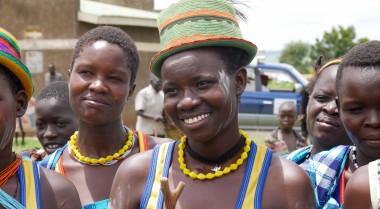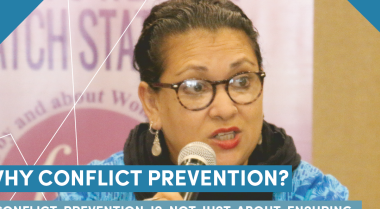
People, Planet… and Peace: A Shared Statement by Peacebuilding Organisations
The United Nations (UN) was founded to “save succeeding generations from the scourge of war.” Now, 75 years later, will we reaffirm our commitment to collective action, centered on a vision of a peaceful and prosperous world for all?
The global economic cost of violence now exceeds 14 trillion USD per annum. By the end of 2018, over 70 million individuals were forcibly displaced worldwide as a result of persecution, conflict, violence, or human rights violations. If current trends persist, by 2030 more than half of the world’s poor will be living in countries affected by high levels of violence, and the aspirations of millions for a better life will go unmet.
Recent research and analysis, from the World Bank and the UN among others, has demonstrated that neither economic growth alone, nor securitized and militarized approaches, can bring sustainable peace. In an interdependent world, increasingly impacted by the self-inflicted scourges of climate change and inequality, we need to redouble our collective efforts to prevent violent conflict by addressing its roots, and in structuring our response to crisis in ways that support local capacities, respect human rights and align with long-term plans to build sustainable peace.
The coming year provides many opportunities for Member States to recommit to peace, including the Sustainable Development Goals (SDGs) Summit; the 2019 Climate Action Summit; the 25th anniversary of the Beijing Women’s Conference; the 20th anniversary of UN Security Council Resolution 1325; and the review of the Peacebuilding Architecture and impending report by the UN Secretary-General on Peacebuilding and Sustaining Peace. As Member States gather for the 74th UN General Assembly, our organizations devoted to building peace around the world call on the international community to:
- Move from commitments to action on peace in the 2030 Agenda and across the three UN pillars: One of the main achievements of the 2030 Agenda was to commit to a radically different approach to development, particularly in conflict-affected and transitional environments. Fostering people-centered social, economic and political inclusion, ensuring access to justice and human rights, strengthening the social fabric and delivering good governance have repeatedly been shown to be essential to achieving prosperity and peace, universally and at all levels of development. We call on Member States to accelerate their commitment to peace, the gateway to achieving the SDGs.
- Align crisis response with longer term prevention and peacebuilding efforts: If we are to move beyond late-stage, reactive, expensive and often ineffective responses to complex crises, including where climate change and migration are factors, governments need to fully embrace a commitment to preventive action by fostering resilience. Resilient societies are just and inclusive, where the relationships between individuals, their communities and the state are based on trust and the respect, protection and fulfillment of everyone’s human rights, and where there are robust mechanisms for addressing inequality, difference and grievances. When a crisis response is nonetheless required, we call on relevant actors to structure and implement such interventions in a way that does no harm, is people-centered and holistic, and explicitly aligns with longer term efforts to sustain peace.
- Protect and support civil society in fostering sustainable peace: Social, political and economic changes that contribute to increasing peace are more robust if they are owned, implemented and sustained by local actors, including youth and women. Nevertheless, civil society inclusion continues to be under threat around the world, with onerous restrictions imposed on the ability of civil society groups to be effective, speak out and access funding. We call on Member States to recommit their support for and partnership with local and community actors, and for the UN system to model inclusion in all its local and global processes.
- Think local and act global: recommit to multilateralism as a safeguard for the most vulnerable: National implementation alone will not suffice to achieve the SDGs or to address the global challenges of climate change and inequality. This is particularly the case with issues of peace, where fostering the external drivers of peace, justice and inclusion requires concerted action by states, as duty holders, to strengthen adherence to international humanitarian law, support responsible trade, reduce arms flows, and promote constructive financial, tax and investment practices. Member States should also seek to strengthen a rules-based system that creates a more effective enabling environment that privileges the long-term peace, development and human rights of all people and communities.
See which organisations signed on to the statement.


